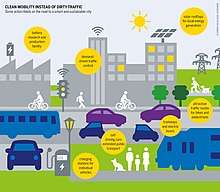EcoMobility
Ecomobility is travel through integrated, socially inclusive, and environmentally friendly transport options, including and integrating walking, cycling, public transport and other climate and people friendly innovative modes of transport. By enabling citizens and organizations to access goods, services, and information in a sustainable manner, ecomobility supports citizens’ quality of life, increases travel choices, and promotes social cohesion.

It is neither a new kind of transportation nor is it a collective word to indicate heterogeneous transport. Ecomobility indicates a new approach to mobility that highlights the importance of public and non-motorized transport and promotes an integrated use of all modes in a city. Environmentally sustainable and socially inclusive, ecological mobile transport choices have low to no emission compared to the personal automobiles powered by fossil fuels. It supports the use of light electric vehicles, provided that the source of the electricity is from renewable energy sources. Incorporating Ecomobility into the development of traffic systems and policies will benefit local governments in attaining international recognition for the city and its leadership.
ICLEI has a dedicated agenda to promote ecomobility in cities titled the EcoMobile City (sustainable urban transport) Agenda. Under this agenda ICLEI executes the following 3 key projects:
EcoMobility Alliance was created in October 2011 in Changwon, Korea. It is a transformation of the earlier Global Alliance for EcoMobility, which is a non-governmental organization founded and launched in Bali on 10 December 2007, on the occasion of the 2007 United Nations Climate Change Conference (UNFCCC-COP-13).[1][2] ICLEI legally represents and hosts the Secretariat of the EcoMobility Alliance. The Secretariat office is located in Bonn, Germany. The EcoMobility Alliance is an international non-profit partnership that works to promote EcoMobility and thus reduce citizens’ dependency on private motorized vehicles worldwide. The EcoMobility Alliance is chaired by a visionary city leader.
Ecomobility Alliance Chairs [as of December 2016]:
EcoMobility World Festival, is a month long experiment taken up by challenging and visionary city leaders to display an automobile free lifestyle in a neighborhood of a city. Citizens in this neighborhood will show the world that a normal life can be lead without depending on personal automobiles. Citizens will embrace the improved walking, cycling and public transport facilities and use light electric vehicles, to replace the otherwise motorized trips in the neighborhood.
EcoMobility World Festivals so far [as of December 2016]:
- EcoMobility World Festival 2013, Suwon, Republic of Korea
- EcoMobility World Festival 2015, Johannesburg, South Africa [First month long event in Africa to Decongest a central business district (CBD), Sandton]
- EcoMobility World Festival 2017, Kaohsiung, Taiwan
EcoMobility World Congress, provides with a fresh, visionary and enriching perspectives on sustainable urban mobility. The congresses aim to provide comprehensive international knowledge in the field of ecomobility. Renowned transportation experts, change makers, decision makers, city leaders and innovators, from around the globe will present some of the world’s best case studies, and participants will learn how to kick start and implement good policies while engaging in fruitful debates about mobility for the future of sustainable cities.
EcoMobility World Congresses so far [as of December 2016]
- EcoMobility World Congress 2011, Changwon, Republic of Korea
- EcoMobility World Congress 2013, Suwon, Republic of Korea
- EcoMobility World Congress 2015, Johannesburg, South Africa
- EcoMobility World Congress 2017, Kaohsiung, Taiwan
In addition to the projects above, ICLEI's EcoMobile City (Sustainable Urban Transport) Agenda also works on the following areas:
- Urban transport performance measurement in cities
- EcoLogistics: is a dedicated initiative of the EcoMobile City (Sustainable Urban Transport) Agenda to support cities to shared experience on urban freight
- Health and mobility: the agenda also works with cities to highlight the effects of automobile dependence on public health in the forms of sedentary lifestyles, poor air quality and childhood obesity
- Road safety: Urban mobility is the primary reason for loss of life and permanent disability in many developing cities. Through its work in ecomobility, ICLEI support is cities to prioritise non-motorized transport and public transport and design better and safer cities.
For more information on EcoMobility visit: https://www.ecomobility.org
Weblinks
References
- "Archived copy". Archived from the original on 2012-02-18. Retrieved 2014-04-22.CS1 maint: archived copy as title (link)
- "Archived copy". Archived from the original on 2014-04-22. Retrieved 2014-04-22.CS1 maint: archived copy as title (link)